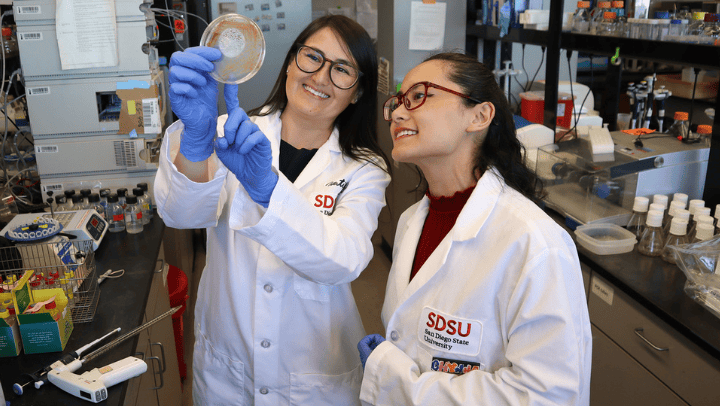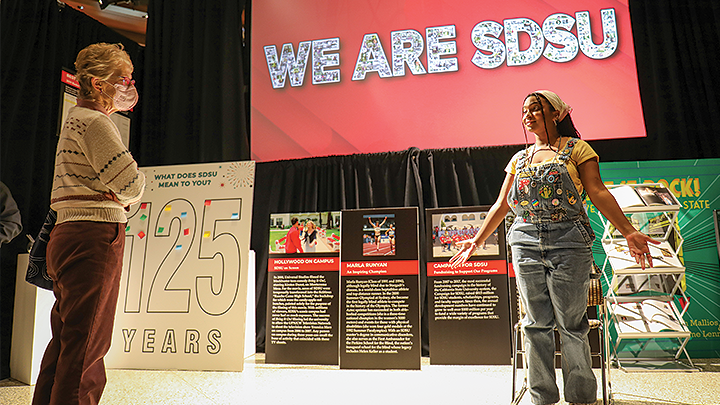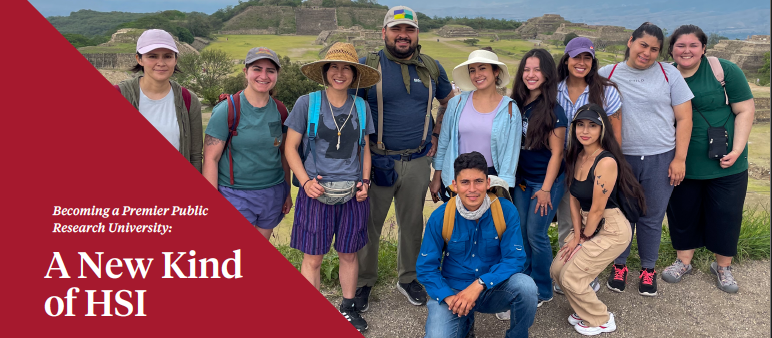Becoming a Premier Public Research University: A New Kind of HSI
SDSU will forge a path to become an R1 Doctoral University where excellence and access converge. To achieve this long-term institutional goal, SDSU will leverage its unique stature as a community-engaged, border-connected, Hispanic-Serving Institution (HSI) located on Kumeyaay land. We are committed to developing infrastructure and resources that enable our research activity to grow while continuing to support excellence in teaching.
Metrics of progress:
- Research expenditures and grants received
- Graduate student enrollment and degrees
- Student involvement in research, community engagement
- Research activities related to HSI, transborder, community, diversity, social justice
- Achievements related to research, HSI
Goal 1: Position SDSU to ultimately achieve R1 status

Accomplished: SDSU is R1
In 2025, SDSU was officially classified as an R1 research institution, the highest distinction given to doctoral universities in the Carnegie Classifications of Institutions of Higher Education. Less than 5% of the 3,941 institutions classified in the U.S. are R1s. This happened at a time when university researchers are securing more research grant dollars.
All Activities
| Description | Status |
|---|---|
ACTIVITY #1June 2021 - Conduct an assessment with recommendations for needed resources for the university’s research infrastructure (such as library acquisitions, equipment needs, research support). Additional recommendations from external consultant are pending [spring 2024]. |
COMPLETEIdentified both specific opportunities, and broader issues that may be appropriate for further investigation, such as: issues of campus resource funding, especially as related to research activity that may fall outside of the current, outdated legislative mission; issues of staff and personnel climate, issues related to updated digital and security infrastructure. |
ACTIVITY #2
June 2022 - Develop proposals for at least three new collaborative research centers with more than $1.5 million each in external funding per year in response to external requests for proposals (RFPs).
|
COMPLETE
Submitted 9 proposals for new collaborative research centers with an additional 4 projected between the submission of these recommendations and May 2023. |
ACTIVITY #3
June 2025 - Formally propose eight to 10 new strategically placed Ph.D. programs while advocating for the authority to offer independent doctorate degrees. |
IN PROGRESS1 new program approved (Doctoral program in Public Health); AB 656 approved. |
ACTIVITY #4
June 2025 - Secure authorization and funding for at least one new LEED (gold or platinum) certified major research facility. |
IN PROGRESSPending resources. |
Additional Accomplishments
The CTRO heads up the new Research & Cyberinfrastructure (R&CI) group within the IT Division with a focus on supporting and expanding the university’s Cyberinfrastructure used by faculty, researchers, and students. The group has focused its work around this strategic plan goal, with the following accomplishments:
- Created and filled 3 FTE positions in R&CI; 2 research software engineers and 1 research support analyst. These positions directly support researchers’ use of Cyberinfrastructure and assist projects, both pre and post award, with consultation, system architecture, and use of available local and national resources.
- Formed a faculty-led Cyberinfrastructure Committee, chaired by VP for Research and Innovation and VP and Chief Information Officer, in Fall 2021 with representatives from all colleges, including Imperial Valley. Committee tasked with collecting Cyberinfrastructure needs from colleagues.
- Funded by PBAC, and identified as a need by the Cyberinfrastructure Committee, deployed a new instructional high-performance computing cluster known as VERNE for faculty and student use. Spare cycles are used by faculty and student researchers. Since Spring 2023, VERNE has supported over 21 courses and 4 research projects.
- Subrecipient in September 2022 of $1.25 million, 5-year NSF CyberTraining grant known as Cyberinfrastructure Professional (CIP). This grant funds 1 FTE each year for 5 years to attend Cyberinfrastructure training teaching them the skills needed to provide facilitation, consultation, and support to researchers on a wide-range of topics.
- Awarded in January 2024 a $1 million, 2-year NSF Campus Cyberinfrastructure (CC*) grant for Technology Infrastructure for Data Exploration (TIDE). This grant funds a computational core within the CSU providing SDSU researchers access to advanced compute and graphical storage units (GPUs) with a focus on artificial intelligence (AI) and machine learning (ML) workloads.
- Funding programs: 1) Last year, DRI and CGS secured one time funding to support graduate students who had advanced to candidacy complete their thesis/dissertation work.; 2) Doctoral students could apply for a $10,000 scholarship. This funding assisted students in the timely completion of their project; 3) In addition, the UGF program provides funding for students to focus on their research and scholarly activities.
- Hired a dedicated doctoral program specialist to centralize many processes across campus.
- Improved communication activities: 1) CGS increased its communication with program directors regarding time to degree; 2) CGS increased its communication with program directors regarding steps for graduation (including dissertation publishing); 3) CGS has streamlined the form needed for to initiate graduation, and 4) CGS increased communication with our partner campuses.
- New intramural programs developed to help seed faculty RSCA funding: 1) an annual assigned time for RSCA for individuals and for teams; 2) SDSU Grants for Established RSCA that provides up to $20k in funding to help support a grant proposal submission; 3) Postdoctoral matching program that provides up to $100k in funding to faculty for a postdoctoral scholar, 4) up to $50k in funding to support research and grant submissions for SDSU centers/institutes, 5) An equipment and dataset program that provided $1.7M in funding to support equipment or datasets purchases for faculty, and 6) a Research Advancement Fellow program that provided release time for faculty in CAL, PSFA, and Education to work with Research Advancement in service to providing better DRI support to faculty in these colleges.
- Grant support programs: 1) Grant reviews from TIG (The implementation group) and Hanover Research, 2) Assistance with graphic design for publications and grant proposals, 3) GREW (Grant Research and Enterprise Writing programs for faculty, postdocs and doctoral students; 4) internal grant proposal support (e.g., specific aims reviews, biosketch creation, facilities and resources creation); 5) interdisciplinary team formation support
- Faculty mentoring through the MC10 program
- Development of a community for postdoctoral scholars.

Accomplished: SDSU has formed five new partnerships with institutions in Latin America
SDSU partners include the Center for Mesoamerican Studies in Oaxaca, the Archivo General del Estado de Oaxaca and Municipio de Tijuana.
All Activities
| Description | Status |
|---|---|
ACTIVITY #5
June 2025 - Submit proposals for 80% of federally designated HSI competitions for which SDSU is eligible each fiscal year. |
COMPLETEOn-going work and oversight by HSI Advisory Council. Created a sustainable tracking and reporting framework, built and delivered additional learning for faculty and staff regarding our HSI status, implemented permanent reporting innovations to track participation, and linked critical stakeholders on campus in pursuit of the overall objective of the task. |
ACTIVITY #6
June 2025 - Establish new research partnerships with three universities in Latin America.
|
COMPLETEEstablished Center for Mesoamerican Studies; MOU with La Salle University in Oaxaca; securing new MOUs with the Tecnológico de Los Valles Centrales in San Pablo Huixtepec, Child Family Health International in Oaxaca, Universidad del Valle in Cali, Colombia, and discussing potential collaborations with UNAM. |
ACTIVITY #7
June 2025 - Conduct hires of faculty members (five to 10 lines) clustered around public-facing, border or Indigenous scholarship. |
IN PROGRESSPending resources. |
Additional Accomplishments
- Office of HSI Affairs and advisory councils established
- Received the Seal of Excelencia
- Attained AANAPISI status
Grant project completed cluster hire of 11 early-career faculty across disciplines to bolster Latinx health disparities research and strengthen the pipeline of scientists focused on the subject.
- Launched the Native & Indigenous Research & Arts Symposium and the Black Research Symposium

